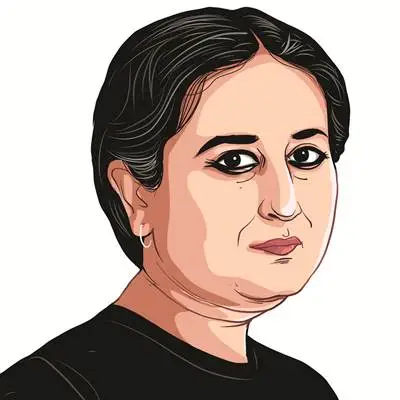Opinion Vandita Mishra writes: A people haunted by the past go to polls, a new actor climbs on to the stage
In Kashmir, this election is a turning point, but the work of politics has only just begun. In Bihar, it remains to be seen if Prashant Kishor’s party can find an opening
 People queue up to cast their votes in Anantnag, in the recently concluded Jammu and Kashmir elections. (Express photo by Shuaib Masoodi)
People queue up to cast their votes in Anantnag, in the recently concluded Jammu and Kashmir elections. (Express photo by Shuaib Masoodi) Dear Express reader
In the last week, two assembly election processes were completed, and one of them saw voting after a decade of electionlessness, and five years after the unprecedented step of a state being carved into two Union Territories. And in the country’s most backward state with the highest number of the poor, a new party was born.
The wheels of India’s politics keep turning, and amid the great challenges of change, it shows a capacity to renew itself. In Jammu & Kashmir, participation and voting became the new consensus that overtook boycott politics in this election. And in Bihar, Prashant Kishor’s Jan Suraaj party is the new entrant that audaciously promises a “naya vikalp (new alternative)” in a battle-weary landscape scarred with political experiments that fizzled out into unfulfilled possibilities.
In the end, in J&K, the election may be far more consequential than its outcome. Exit polls give the winning edge to the National Conference-Congress combine, but whatever be the final tally on October 8, what will remain far more significant is this: That, stripped of its special status and statehood, Kashmir trudged to the polling booth and, arguably for the first time after 1987, the poll process was joined by both separatists and the mainstream.
This casts a longer and larger responsibility on the Centre, regardless of who loses and who wins. In July this year, the Union ministry of home affairs amended, by executive notification, the transaction rules pertaining to the Jammu and Kashmir Reorganisation Act 2019, enacted alongside the revocation of Article 370, which gave the Lieutenant Governor a role bigger than the assembly. The amendments increased the already considerable powers of the L-G, inserting new rules that enhance his discretion in administrative domains, from police to public order, from anti-corruption to key appointments and services.
This move to underline central control, by handing crucial powers of the elected government to an unelected constitutional functionary appointed by the Centre, erodes the promise of democratic representation. It will also be especially at odds with the heartening trust reposed by the people of J&K in the power of the vote, first in the Lok Sabha poll and now in the election to the assembly.
Delhi, the only other UT with a legislature, has shown how attrition between an elected government and the L-G’s office can tamper with the fundamental pact between citizen and state by smudging the lines of accountability, even as it takes a toll on governance. The people of Kashmir, still haunted by ghosts not yet laid to rest, deserve a fuller power to shape their future through a government that is empowered and responsive.
Clearly, then, while this election is a turning point, the work of politics has only just begun all over again in Kashmir. It will need to build on this moment, step by step, carefully.
In Bihar, the launch of the Jan Suraaj party could just be Prashant Kishor completing his own personal-political arc, from behind the scenes strategist to onstage actor — or it could become more than just that.
In a system where the threshold for entry of new players is set very high, Kishor is leveraging the celebrity he has already courted, and acquired, in party backrooms, across the political-ideological spectrum, from so-called secular to communal, from national to regional forces. He is striking out on his own in a landscape that has been home to the rise and fall of political movements that changed the course of the nation, not just the state. He is doing so in an arena that is always-already teeming with political players and parties.
It may be that Kishor has spotted the opening. This is a time when Bihar’s stalwarts who have defined its politics since the 1990s — Lalu Prasad and Nitish Kumar — have run out of energy and influence. Nitish, despite the general election showing, is waning, and his party, JD(U), does not have a second rung. In the RJD, Lalu’s son Tejashwi has not yet fully stepped up to the plate. Their slogans, “samajik nyay (social justice)”, and “vikas (development)”, and the combinations of the two, have plateaued in terms of their promise and meaning in a state of persisting backwardness and continuing inequalities.
Kishor’s gamble is that Bihar is ready for a new party. He shows shrewdness in seeing the cracks and seizing the openings — he reframes the political question as one that places at its centre not caste or community, nor ideology or the leader’s identity, but the future of Bihar’s children, their education and jobs.
It is early days yet, and still difficult to say whether the people of a state inured to the ebb and flow of politics will again suspend disbelief.
Till next week,
Vandita






